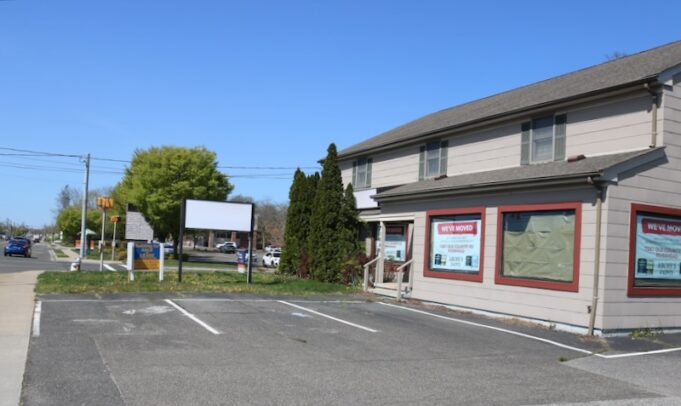A proposed cannabis dispensary on Route 58 met resistance from members of the Riverhead Zoning Board of Appeals during a hearing Thursday night at Town Hall.
The applicant’s attorney, Martha Reichert, a partner in the Riverhead law firm Twomey, Latham, Shea, Dubin and Quartararo, presented the application for a variance to a skeptical ZBA and was peppered with questions and counterpoints by two members of the board and the board’s counsel, Deputy Town Attorney Annemarie Prudenti.
In the midst of one back-and-forth exchange during which she found herself repeatedly interrupted and was pressed by a board member to simply answer yes or no, Reichert said, “May I please respond in more than just a simple yes or no, because I don’t feel like this is a cross examination. I’m here to present the case.”
The applicant, Brian Stark Enterprises LLC holds a Conditional Adult-Use Retail Dispensary license and proposes to locate an adult-use dispensary at 1086 Old Country Road, the former site of Aboff’s Paints. The company bought the property in January 2024. [Editor’s note: Brian Stark is not the same person nor any relation to the local business owner with the same name.]
Setback distance sparks debate
While the site is located within one of the designated commercial corridors in town where a cannabis dispensary is an allowed use, it is located less than 1,000 feet of the property line of Riverhead High School.
Town code requires dispensaries to be located at least 1,000 feet from any school, library, or daycare, measured from property line to property line. Since the school property is only 735 feet south of the proposed site, a variance from the ZBA is needed.
The ZBA has authority to grant exceptions to zoning rules, such as minimum distances and property sizes, when certain criteria are met.
Reichert argued the dispensary would not impact the character of the community or the environment. She emphasized that the applicant has a state license and that the property complies with all New York State regulations designed to minimize security risks and odors.
In New York, cannabis products cannot be sold to anyone under 21 years old, similar to alcohol and tobacco laws. State regulations also ban dispensaries from marketing to minors and prohibit locations on the same street and within 500 feet of a school.
There is “no visual or physical connection between the school property and the applicant’s property,” Reichert said. She noted that between the two properties, there is a four lane highway (Route 58), and a large shopping center. The school property itself, she said, is fenced off.
Walking on public property from the school to the site — along Harrison Avenue and Route 58 — would be a nearly three-quarters-of-a-mile walk, she said.
Board members voice concerns
ZBA member John Porchia III challenged that characterization. Students often cut through private property to visit shopping centers, he said.
“There’s a pathway by the baseball field — we’ve all seen it,” Porchia said.
Marijuana has “become a problem in schools,” he said. “Kids are using marijuana. They’re taking gummies. They’re getting exposed to marijuana. They’re bringing the marijuana to school,” Porchia said. “It’s an ongoing problem… it’s not really good for the community [or] good for schools. We’re trying to distance kids from using marijuana while they’re in school,” Porchia said. Having them pass a dispensary on their way to lunch is exposing them to it, he said.
“I understand that. I’m a parent myself,” Reichert said.
ZBA member Ralph Gazzillo echoed Porchia’s concerns, emphasizing the town’s intent to shield children from marijuana exposure by setting the 1,000-foot buffer.
Reichert argued the risk is speculative. “I think it’s a speculative harm here to say that allowing a dispensary 735 feet away will lead to illegal sales to minors,” she said.
Licensed dispensaries are strictly regulated, Reichert said. Customers must show a valid government ID to enter, and violations could result in the loss of a dispensary’s license. “The opportunity for a minor to purchase marijuana is very slim,” she said.
Gazzillo pushed back: “If it’s so difficult for a child to go in and purchase marijuana, why not put it next to the school? You basically told me it’s bulletproof. Why not put it in the school cafeteria? That’s why the 1,000-foot rule is there,” he said.
Town vs. state authority disputed
Reichert compared the cannabis rules to liquor regulations, noting that New York bars liquor stores from opening on the same street within 500 feet of a school.
Reichert argued that only the state controls cannabis dispensary locations. Prudenti, who drafted the town’s cannabis code for the Town Board, disagreed, saying the town has the right to set stricter local rules under its zoning powers.
Porchia also pointed out that the applicant was aware of the 1,000-foot rule before buying the property.
Reichert countered that seeking a variance is an established legal process and that the requested variance is “not substantial.”
“It’s 26%,” Gazzillo said, reading from Reichert’s memorandum of law. “You don’t think that’s substantial? 26%?”
Reichert said cited supporting case law in her memo.
“So the answer is, you don’t believe this,” Gazzillo said.
“When an applicant comes here to seek variance relief, this board engages in an equitable balancing test, just like any other applicant that’s here tonight is seeking a variance from the strict appliance application of one of the dimensional regulations or other aspects of the zoning code,” Reichert said.
The board reserved its decision for a later date.
Riverhead Town adopted its cannabis code in November 2022, by a 3-2 vote of the Town Board. Originally the code made very few sites in the town available for the new use. The board amended the code in March 2024 to relax some of its restrictions, but retained requirements for 1,000-foot setbacks from schools and residential uses.
In February, the ZBA denied a request for a variance from the 1,000-foot setback from residential uses made by a different applicant for a site on Ostrander Avenue. The site in that case was also outside a designated commercial corridor. That applicant, Tink & E. Co., filed a lawsuit in March seeking to have the ZBA decision set aside by State Supreme Court, Suffolk County.
The survival of local journalism depends on your support.
We are a small family-owned operation. You rely on us to stay informed, and we depend on you to make our work possible. Just a few dollars can help us continue to bring this important service to our community.
Support RiverheadLOCAL today.


































